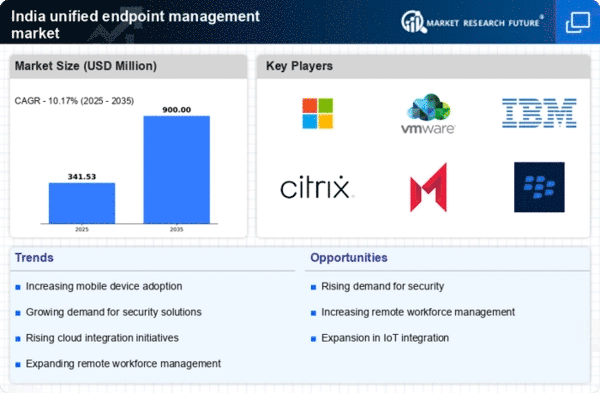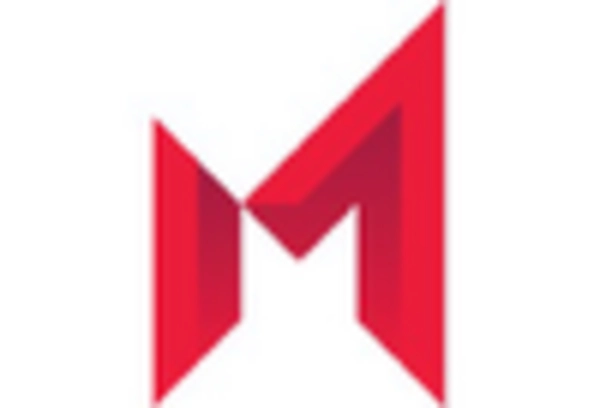Rise in Cybersecurity Threats
The surge in cybersecurity threats in India has prompted organizations to prioritize the security of their endpoints. As cyberattacks become more sophisticated, the need for effective endpoint management solutions has intensified. The unified endpoint-management market is witnessing increased demand as businesses seek to protect their networks from potential breaches. Recent statistics indicate that cybercrime costs Indian businesses over $4 billion annually, underscoring the urgency for robust security measures. Companies are investing in unified endpoint-management systems that offer advanced security features, such as threat detection and response capabilities, to safeguard their digital assets. This growing awareness of cybersecurity risks is likely to drive the expansion of the unified endpoint-management market.
Increased Adoption of Mobile Devices
The proliferation of mobile devices in India is reshaping the landscape of the unified endpoint-management market. With a significant portion of the workforce utilizing smartphones and tablets for work-related tasks, organizations are compelled to implement management solutions that can effectively oversee these devices. The mobile device management segment is projected to grow by approximately 25% in the coming years, reflecting the increasing reliance on mobile technology. Unified endpoint-management solutions are essential for ensuring that mobile devices are secure, compliant, and integrated with corporate systems. This trend is likely to bolster the growth of the unified endpoint-management market as businesses adapt to the mobile-first approach.
Growing Demand for Remote Work Solutions
The increasing trend of remote work in India has led to a heightened demand for unified endpoint management solutions. Organizations are seeking to manage a diverse range of devices, including laptops, smartphones, and tablets, from various locations. This shift necessitates robust management tools that ensure security and compliance while providing seamless access to corporate resources. According to recent data, the remote work segment is projected to grow by approximately 30% in the next few years, driving investments in endpoint management solutions. Companies are prioritizing the deployment of unified endpoint-management systems to enhance productivity and maintain operational efficiency, thereby propelling the growth of the unified endpoint-management market.
Regulatory Compliance and Data Protection
In India, the regulatory landscape surrounding data protection is evolving, with new laws and guidelines being introduced to safeguard sensitive information. This has created a pressing need for organizations to adopt unified endpoint management solutions that ensure compliance with these regulations. Companies are increasingly focusing on data privacy and security, which necessitates the implementation of comprehensive endpoint management strategies. The unified endpoint-management market is expected to benefit from this trend, as businesses invest in technologies that facilitate compliance with regulations such as the Personal Data Protection Bill. This focus on regulatory compliance is likely to drive market growth as organizations seek to mitigate risks associated with data breaches and non-compliance.
Integration of Artificial Intelligence and Automation
The integration of artificial intelligence (AI) and automation technologies into the unified endpoint-management market is transforming how organizations manage their endpoints. AI-driven solutions enable businesses to streamline operations, enhance security, and improve user experiences. In India, companies are increasingly adopting AI-powered endpoint management tools to automate routine tasks, such as software updates and security patches. This trend is expected to drive efficiency and reduce operational costs, making unified endpoint-management solutions more attractive to organizations. As AI continues to evolve, its application in endpoint management is likely to expand, further propelling the growth of the unified endpoint-management market.
















